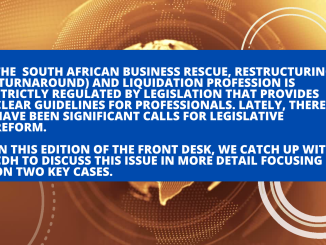

Image By: Flickr/GCIS
The original article can be found here.
Former South African Post Office (SAPO) CEO Mark Barnes’ proposal to save the now-bankrupt state-owned enterprise (SOE) and turn it into a national treasure still stands.
The SA Post Office was placed under provisional liquidation earlier this year for failing to settle its enormous debt.
The enterprise is technically insolvent and has lost money since 2013. It has been forced to close branches across the country for years and has had to cut thousands of jobs.
“According to its most recent financial statements for the 2021/22 year to end-March 2022, it owed more than R4.4 billion to creditors, and its debt exceeded its assets by R4 billion,” Business Day reported.
SAPO received a debt bailout earlier this year. National Treasury awarded the struggling enterprise R2.4 billion after it was placed under provisional liquidation and announced that it would have to cut 6,000 jobs (which later decreased to 1,724).
The provisional liquidation means SAPO’s assets are going to be placed under the control of a liquidator, who will manage the SOE’s affairs and work to pay off its debts. It also halts payments to creditors.
However, there is still hope for the post office to avoid liquidation if it can secure a bailout or find a buyer to take over its operations before 1 June 2023, when the case returns to court.
Other firms owed money by SAPO can also approach the court and oppose the liquidation.
Barnes’ proposal
Barnes was the SAPO CEO from 2016 to 2019 before he left his position because he differed from the government on a strategy for the SOE.
However, Barnes and an unnamed consortium offered to buy a majority stake – between 60% and 75% – in SAPO in 2021 to save the struggling enterprise.
His offer was dismissed, and in February 2022, Barnes released the proposal he submitted to the Communications and Digital Technologies Minister at the time, Khumbudzo Ntshavheni, on Business Day.
His “proposal for turning the post office into a national treasure” involved an independent body (like the Auditor-General) determining the group’s net asset value at the time of purchase.
The body would also determine the present value of the forecast losses. Barnes’ purchase price would be the difference between the two.
Barnes told The Money Show’s Bruce Whitfield that this offer is now worth R2.4 billion less than when he made it because the government bailout would not have been needed if his proposal was accepted.
He also told Whitfield that, despite SAPO’s current state of insolvency, his original offer to take over the enterprise still stands.

Image By: Shutterstock/MD Photography
Terms and Conditions
Barnes laid out three conditions that have to be met to turn the enterprise around.
- There must be an agreed strategy going forward.
- SAPO needs an estimated R8 billion in capital to settle its liabilities and put it in a steady state going forward.
- The Post Office needs leadership, specifically a management team with a three-year mandate to deliver a competent, functional organisation.
“If those conditions are met, then you end up saving a commercially irreplaceable infrastructure, a fabulous channel between the government and the people of South Africa and a whole bunch of jobs and precious data the state could use for the virtue of our people,” he said.
However, if the Post Office is not saved, all its current services and revenue will go into the private sector.
“The private sector has a very simple motivation, which is to make a profit. I don’t believe that if the private sector took over all the functions it would serve more than 5% of the population.”
Barnes has said that SAPO has “commercially irreplaceable infrastructure” and privatising the enterprise would be “fundamentally wrong and inappropriate”.
He specified that his offer only stands if it is overseen with proper due diligence by the Auditor-General and he is given three months to come up with the capital.




